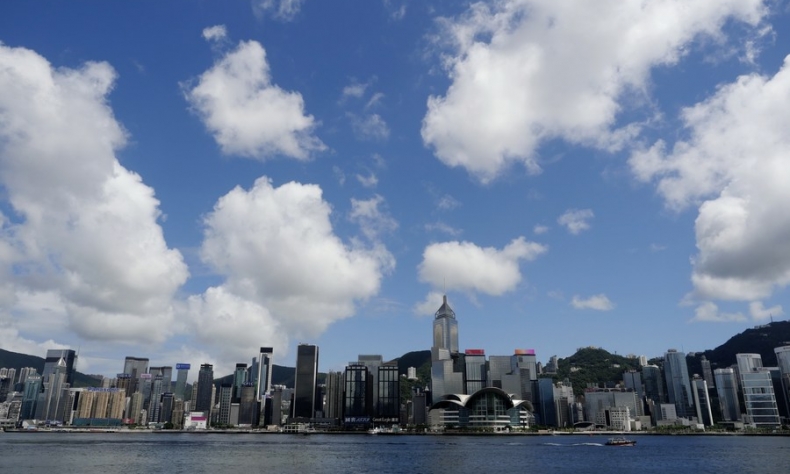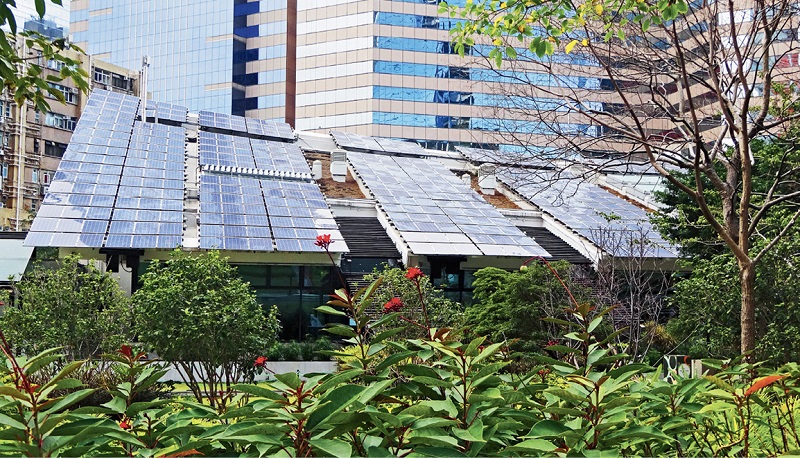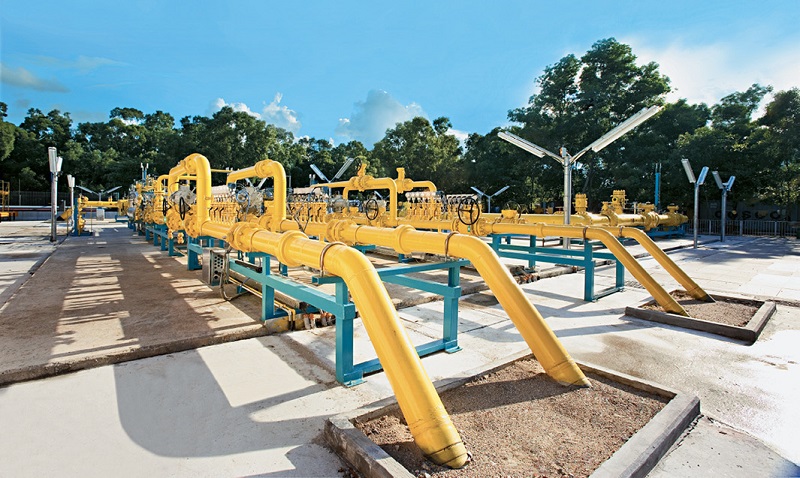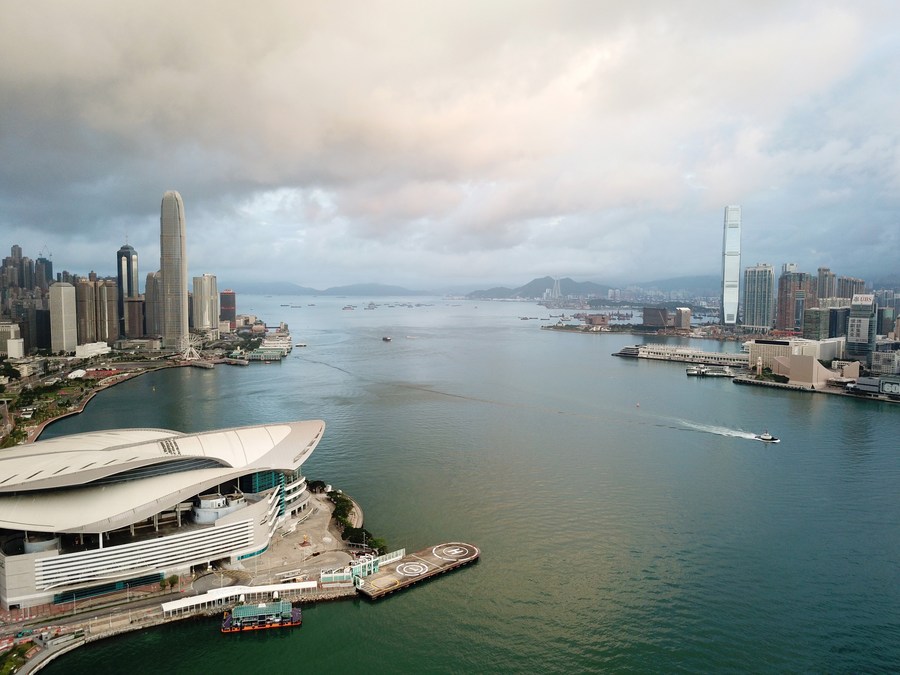Accelerating Green Transition

Hong Kong is one of the first Asian cities to take action in the fight against climate change.
Hong Kong is one of the first Asian cities to take action in the fight against climate change. According to Hong Kong’s Climate Action Plan 2050 released by the government of Hong Kong Special Administrative Region (HKSAR) in 2021, the region stopped building coal-fired generating units in 1997 and has been phasing out existing ones. Its total carbon emissions peaked in 2014 and have shown a downward trend since then.
Unveiling more measures
With few energy-intensive industries, Hong Kong is an economy that is dominated by the tertiary industry. Its largest source of carbon emissions in 2019 was electricity generation (66 percent), followed by transportation (18 percent) and waste (7 percent). When combined together, these three sources account for more than 90 percent of its total local emissions.
In line with China’s “dual carbon” strategy proposed in 2020, Carrie Lam, then chief executive of the HKSAR, proposed in the 2020 Policy Address that Hong Kong will strive to achieve carbon neutrality by 2050. Hong Kong’s Climate Action Plan 2050, released in 2021, set out a specific timetable for achieving carbon neutrality, in which it outlined four major decarbonization tactics, namely “net-zero electricity generation”, “energy saving and green buildings”, “green transport”, and “waste reduction.” These efforts will lead Hong Kong in reaching the goal of carbon neutrality before 2050. The action plan also delineates the more vigorous interim decarbonization target of reducing Hong Kong’s carbon emissions by 50 percent before 2035 as compared to the 2005 level.
The Policy Address by the Chief Executive of HKSAR John Lee Ka-chiu in 2022 revealed a number of new measures towards carbon neutrality:
Conserving Energy: The goal is to improve the overall energy performance of government buildings and infrastructure by more than six percent by 2024-25. Hong Kong will accelerate the incorporation of district cooling systems in new development areas (including Northern Metropolis) to reduce energy consumption. The region is preparing legislative amendments to expand the scope of the Mandatory Energy Efficiency Labelling Scheme to include more household appliances. By doing so, the share of household appliances under the scheme in the total residential energy consumption will increase from 50 percent to about 80 percent.

Promoting Green Transport: the HKSAR government will stop the new registration of fuel-propelled and hybrid private cars by 2035 or earlier. During the coming three years, an additional 7,000 parking spaces equipped with electric vehicle chargers will be built on government premises. To expedite low-carbon transformation in the transport sector, the government will also conduct trials of new-generation electric taxis, as well as hydrogen fuel cell electric double-deckers and heavy vehicles in 2023. Moreover, Hong Kong will introduce about 700 electric buses and 3,000 electric taxis by the end of 2027.
Promoting Waste Reduction in the Community: To achieve the goal of zero landfill by 2035, Hong Kong will strive to engage the entire community in waste reduction and waste sorting for recycling. In addition, it will expedite the development of modern waste-to-energy incinerators.
The two strategic growth zones in the plan, namely North New Territories and artificial islands in the Central Waters, aim to be carbon neutral, flexibly introduce complete environmental protection systems and equipment, and add green building planning elements to match the concept of a smart city, said Tse Chin-wan, secretary for environment and ecology of the HKSAR government.
A number of new carbon neutrality measures were also purposed in the 2023-24 budget. The HKSAR government will earmark HK $200 million under the New Energy Transport Fund for progressively commencing trials of hydrogen fuel cell electric double-deckers and heavy vehicles this year in collaboration with franchised bus companies and other stakeholders. It will also set aside HK $350 million to provide subsidies to four in-harbor ferry operators for the construction and trials of electric ferries and related charging facilities.
Moreover, a loan scheme with a 100 percent guarantee for the taxi sector will be put in place as an incentive for taxi owners to replace their existing vehicles with electric ones. It is estimated that the proposed measure would involve a loan guarantee of about HK $6.4 billion. In 2023-24, the government will allocate additional funding amounting to HK $62 million to gradually expand the scope of food waste collection to cover more public and private premises, including food producers, markets, hotels, and large shopping malls. The food waste collection trial scheme for public rental housing estates will also be extended to cover a total of 100 buildings, involving about 150,000 residents. It can not only reduce the smell of food waste discarded in landfills, but also send the food waste to the organic resource recovery center and convert it into renewable energy.

Low-carbon construction
Environmental issues are drawing an increasing amount of attention, and green buildings have become a general trend. The construction of many buildings in Hong Kong has followed the energy-saving and low-carbon concept. Last October, 55 buildings, including the Bank of China Tower and Kai Tak Cruise Terminal Building, were listed in the first Top 100 Low-Carbon Buildings in the Greater Bay Area.
Chief Executive John Lee visited the Middle East from February 4 to 10, 2023 to promote Hong Kong’s trade, investment, and cultural sectors and pursue business opportunities. Nicholas Ho, the accompanying architect, believes that the demand for smart cities and green buildings in the Middle East is increasing day by day. During this visit, Ho signed a memorandum of cooperation with a foreign oil company, hoping to apply the advantages of Hong Kong’s low-carbon building technology to a local smart town.
In recent years, with the growing awareness of environmental protection and waste reduction, Hong Kong citizens have adopted some new living habits, such as taking shopping bags when going out to shop, not using plastic drinking straws, and actively sorting and recycling household garbage.
To strengthen support for public waste reduction, the Environmental Protection Department has established a new community recycling network and launched various projects in 18 districts of Hong Kong to support the public in waste and recycling and create a green community life.
Promoting green finance
During the process of carbon neutrality transformation, green finance is undoubtedly an important driving force. The HKSAR government has actively promoted green finance development over the years to contribute to carbon neutrality.
In 2018, the government launched the Government Green Bond Program, with an initial borrowing ceiling of HK $100 billion. The issuance of the first batch of HK $20 billion of retail bonds in May 2022 further expanded the range of green, sustainable financial products in Hong Kong and promoted the development of green, sustainable finance. The government raised offshore green bonds up to the equivalent of US $5.75 billion in U.S. dollar, euro, and RMB in January 2023. The triple-currency offering is the largest ESG bond issuance in Asia. The government announced on February 16, 2023 the successful offering of HK $800 million worth of tokenized green bond, which is the first such bond issued by a government globally. This will help accelerate the development of green and sustainable finance in Hong Kong and support the government’s climate strategy.

In terms of enterprises’ green financing, the Green and Sustainable Finance Grant Scheme was launched in 2021, and has since granted funding to more than 200 related debt instruments issued in Hong Kong, involving a total debt value of nearly US $70 billion.
According to its 2023-24 budget, Hong Kong will actively seize the opportunities brought by China’s “dual carbon” strategy. Hong Kong should also leverage its advantage in “One Country, Two Systems” policy and as an international financial center, to accelerate its development into an international center for green technology and finance.
Hong Kong will proceed in five directions, namely: (a) Building a green technology ecosystem to attract top-notch enterprises and start-ups, encourage efficient interaction among industry, academia, and research sectors to commercialize R&D outcomes, and boost the demand for green technology through policy support; (b) Green finance application and innovation. Financial innovations will facilitate green projects to obtain capital more conveniently and flexibly apart from traditional financing channels; (c) Green certification and alignment with international standards; (d) Training for talent; and (e) Enhancing the exchange and cooperation across the Guangdong-Hong Kong-Macao Greater Bay Area and with international markets.
According to the Financial Secretary Paul Chan, a Green Technology and Finance Development Committee will be set up, and the regional government will hold the International Green Technology Week at the end of this year.
According to Be the Green Leader, a blog issued by Paul Chan on February 26, green technology and green finance are major international trends. Statistics indicate that the global market of green technology will reach US $417.4 billion in 2030, with an annualized compound increase of 31.5 percent as compared with that in 2021, at US $35.5 billion. It will prove to be a huge market. The building of an international green technology and green finance center will open up new horizons for Hong Kong.

Cultivating talent
In response to the changes in climate caused by carbon emissions, there is an urgent need for qualified professionals in carbon neutrality in China including Hong Kong, and other countries and regions around the world.
Carbon-related professionals in Chinese mainland are mainly working in enterprises participating in pilot programs on carbon emissions trading, third-party organizations, carbon emission exchanges, financial institutions, and universities. Carbon emission administrator was listed into China’s occupational classification system in March 2021.
To promote the application of green technologies, the HKSAR government set up a Green Tech Fund in 2020 to finance projects which help Hong Kong decarbonize and enhance environmental protection. In this way, Hong Kong can attract more talent of green technology and business.
In 2022, to attract young people in seizing employment opportunities brought about by the low-carbon transition, the Environment and Ecology Bureau and the Environmental Protection Department of Hong Kong launched a series of curriculum plans, which include the Graduates Subsidy Program to subsidize private companies and organizations to recruit new graduates for environment-related jobs, and the GreenPro Training Program to provide professional training courses.
In November 2022, the Hong Kong Polytechnic University made the commitment to develop into a leading training center for carbon management professionals, with the Department of Applied Biology and Chemical Technology offering a special course Master of Science in Sustainable Technology for Carbon Neutrality.
 Facebook
Facebook
 Twitter
Twitter
 Linkedin
Linkedin
 Google +
Google +










